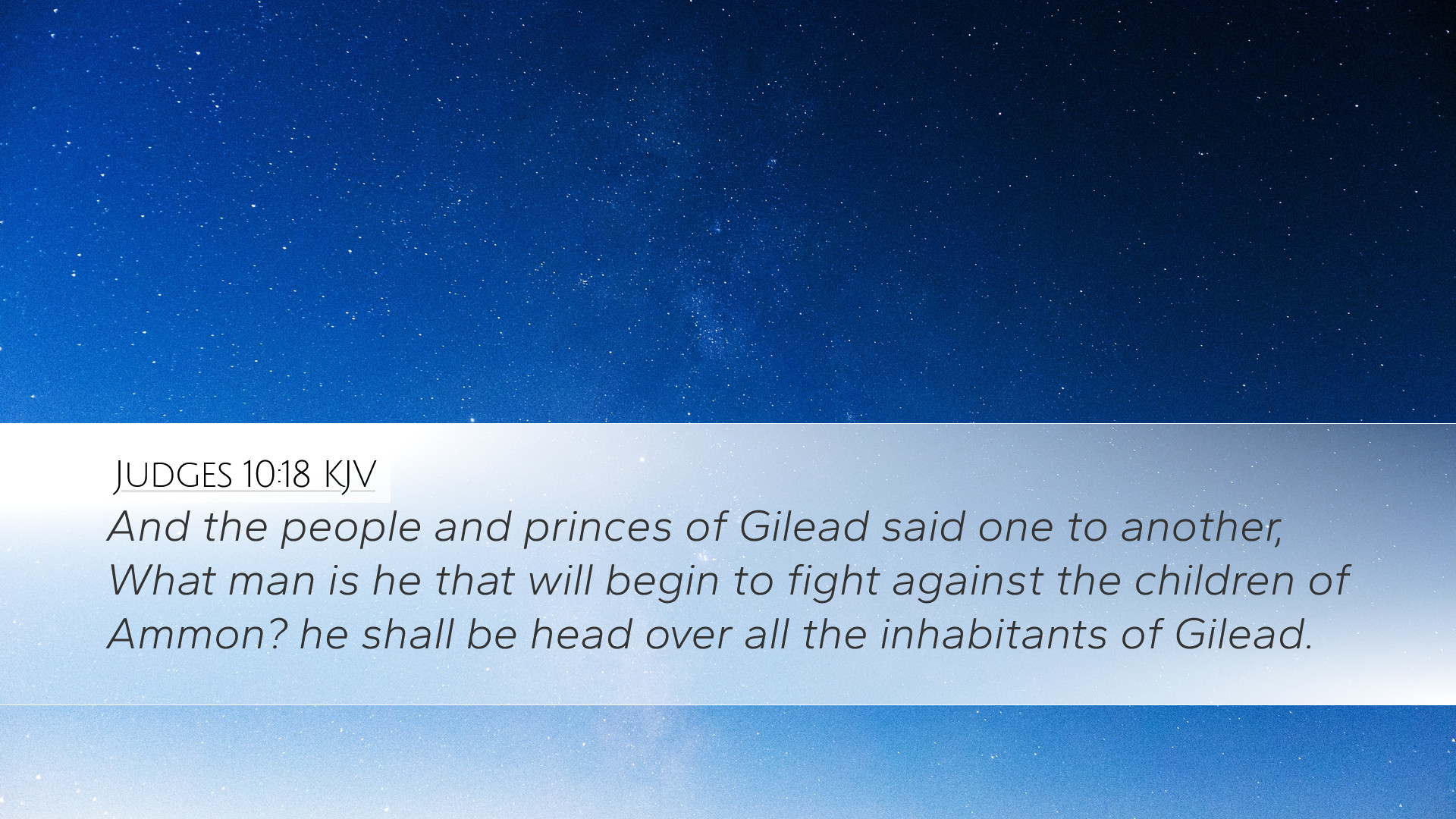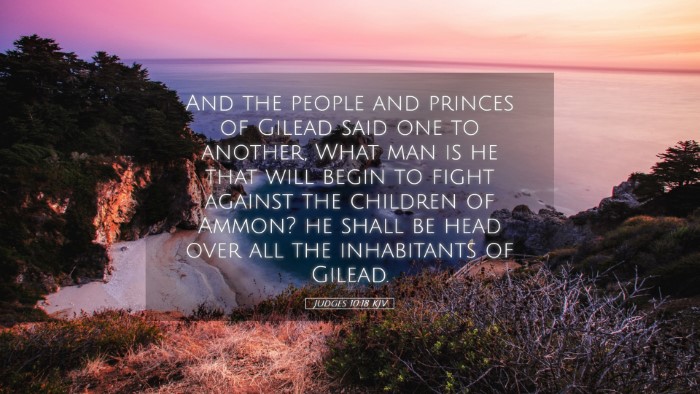Old Testament
Genesis Exodus Leviticus Numbers Deuteronomy Joshua Judges Ruth 1 Samuel 2 Samuel 1 Kings 2 Kings 1 Chronicles 2 Chronicles Ezra Nehemiah Esther Job Psalms Proverbs Ecclesiastes Song of Solomon Isaiah Jeremiah Lamentations Ezekiel Daniel Hosea Joel Amos Obadiah Jonah Micah Nahum Habakkuk Zephaniah Haggai Zechariah MalachiJudges 10:18
Judges 10:18 KJV
And the people and princes of Gilead said one to another, What man is he that will begin to fight against the children of Ammon? he shall be head over all the inhabitants of Gilead.
Judges 10:18 Bible Commentary
Commentary on Judges 10:18
Judges 10:18 states: "And the people, the princes of Gilead, said one to another, What man is he that will begin to fight against the children of Ammon? he shall be head over all the inhabitants of Gilead."
Contextual Background
This verse occurs at a significant juncture in the history of Israel's judges. The Israelites once again find themselves pressed by foreign adversaries, specifically the Ammonites, after a period of turning away from God. The cycle of apostasy, oppression, repentance, and deliverance reflects the larger narrative of the Book of Judges. This passage sheds light not only on the political dynamics of Gilead but also on the spiritual leadership and responsibility of God's people.
Comprehensive Analysis
The Cry for a Leader
The assembly of the princes of Gilead exemplifies a moment of desperation. As noted by Matthew Henry, the people recognize their dire need for a leader who could rally them against their foes. In moments of crisis, spiritual and political leadership becomes crucial, highlighting the biblical principle that leadership is a divine calling. The phrase "What man is he that will begin to fight" indicates their readiness to act but also their uncertainty about whom to trust as a leader.
Principles of Leadership
Albert Barnes emphasizes the qualities of effective leaders presented in this scenario. First, the call for someone to lead demonstrates the importance of readiness and courage in times of conflict. Leaders in the biblical sense are not merely figureheads; they are those who are willing to step into the fray, bearing the weight of their people’s burdens. This principle remains relevant today as congregations and communities search for leaders during times of trial.
Tactical Decision-Making
The princes of Gilead’s deliberation reveals a tactical approach to warfare. Adam Clarke highlights the collaborative nature of their decision-making process. This reflects a wise means of governance, recognizing that unity and consensus are crucial, especially when facing formidable enemies like the Ammonites. The need for a consensus leader underscores the necessity of trust and collective action within a community of believers.
Spiritual Reflections
Theologically, the desire for a leader brings forth reflections on God's providence and guidance. A common thread in scripture is God's provision of leaders for His people, particularly in times of distress. The question posed by the Gileadites can be seen as a longing for divine inspiration and intervention. The reliance on God's chosen instrument—one who would not just lead in battle but also restore their spiritual integrity—is paramount.
Historical Leadership and Deliverance
History shows that Israel's leaders often arose in response to both external threats and internal moral decay. The appeal to find a man to lead can serve as a metaphor for broader spiritual leadership. When communities seek leaders, they simultaneously seek alignment with God's will. The cyclical nature of Israel's sin and redemption illustrates the ongoing need for God-centered leadership, which can effectively combat both earthly and spiritual adversaries.
Applications for Today
The passage challenges modern readers to consider the characteristics of their leaders and the qualities that define true spiritual leadership. Here are several applications drawn from Judges 10:18:
- Discernment in Leadership: Communities should seek leaders who are spiritually grounded and capable of guiding with integrity.
- Courage and Resolve: Just as the Gileadites sought a leader to rally against an enemy, so too must believers be bold and unified in the face of opposition.
- Dependence on God: The overarching theme throughout scripture emphasizes the need for reliance on God when seeking direction and leadership.
- Collective Responsibility: The Gileadites demonstrate that leadership is not solely the burden of one person—it is a mutual effort requiring the support and commitment of the entire community.
Conclusion
Judges 10:18 holds profound implications for understanding leadership within the context of divine purpose and community governance. By exploring the insights from Matthew Henry, Albert Barnes, and Adam Clarke, we uncover timeless truths about the need for courageous and humble leadership that answers to a higher calling. As we reflect on this passage, may we commit ourselves to supporting and raising up leaders who will faithfully guide us toward righteousness and victory in our spiritual battles.


